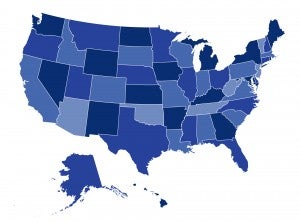
The Affordable Care Act (ACA) played a prominent role in last night’s presidential debate. When asked about the differences between his health policies and those of former-Governor Mitt Romney, President Barack Obama highlighted the Governor’s plan to allow insurers to sell their products across state lines as an alternative to the ACA. In particular, President Obama argued that “there’s no indication that [selling health insurance across state lines] somehow is going to help somebody who’s got a pre-existing condition be able to finally buy insurance.”
And regular CHIRblog readers know that he’s right.
In a study of across state lines laws in six states (and as I blogged yesterday), my colleagues and I found that these laws did not result in a single new insurer entering the market or the sale of a single new insurance product. Because these policies do not result in access to new coverage, it’s unclear how Governor Romney’s plan to allow across state lines sales alone would help individuals with pre-existing conditions.
Aside from whether across state lines policies result in more access to coverage, our findings raise important questions about whether individuals with pre-existing conditions would be adequately protected under such laws and suggests that these proposals could make it more difficult to access coverage.
For example, if insurers are allowed to bypass state protections and choose which state laws they want to comply with, consumers in states with stronger protections could be worse off. A national across state lines proposal has similar potential to wipe out states’ hard-fought consumer protections and could lead to a “race to the bottom” as insurers rush to the state with the fewest regulatory requirements.
In his response during the debate, Governor Romney agreed with President Obama on the need for affordable coverage and noted that “the key task we have in health care is to get the costs down so it’s more affordable for families.” While we can all agree that health insurance costs too much, our study found no evidence that across state lines proposals would bring down health care costs and that these proposals are not the “easy button” that proponents are searching for.
For even more analysis about health reform on the campaign trail, be sure to check out CHIR’s own Mila Kofman in the Huffington Post.

